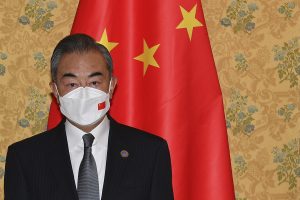2021 was a largely successful year for Chinese foreign policy, due to China’s effective control of the COVID-19 crisis domestically, stable economic growth, and active participation in global governance, particularly in the area of climate change. As Chinese Foreign Minister Wang Yi recently commented in his overview of the year, “We celebrated the centenary of the Communist Party of China and embarked on a new journey for the second centenary. Drawing strength from its achievements in the past century, China’s diplomacy has forged ahead bravely in the game of chess and written a new chapter in major-country diplomacy with Chinese characteristics.”
Nonetheless, looking ahead in 2022, China also faces three major challenges that, in theory, could slow down China’s seemingly unstoppable rise to global center status if not managed well. The first major challenge is how to create a trustable and lovable international image. This is now a particularly serious issue as China continuously narrows its gap with the only superpower, the United States, in many aspects such as economy, technology, and military prowess. As Chinese President Xi Jinping pointed out in a major work conference on international communication in June 2021, the task is “to explain and promote more fine culture with Chinese characteristics, Chinese spirit and Chinese wisdom to the world. We should keep the tone right, be open, confident and modest, and strive to create a credible, lovable and respectable China.”
This is difficult, though. As many polls conducted by international agencies like the Pew Research Center show, China’s image in Western countries has sharply deteriorated over the last couple of years, though the reasons behind the decline are complicated. Regardless of the reasons, how China can maintain a delicate balance between being respected and being feared by other regional and global players will be a long-term issue.
The second major challenge is how to deepen China’s participation in global governance. Top global issues include the COVID-19 pandemic, climate change, and global poverty, among others urgent crises. In 2021 China did a reasonably good job in all three aspects, but the international community will demand more from the country in 2022. China now is seen as a global leader, especially when the United States is deeply entangled in various difficult domestic issues, and thereby unable to provide an effective international leadership role in many areas. The still ongoing COVID-19 crisis is a case in point.
But can China lead the global climate change agenda after a solid performance at COP26 in November 2021? On the one hand, China continues to be the global leader in renewable energy output, with a share of almost 50 percent of global capacity in 2021. On the other hand, China’s heavy reliance on coal for power generation will not change much, even by 2030. Hence China faces a dilemma between international climate pressures and economic growth and stability at home. More generally, the international demand for China to provide more and more collective international goods will only grow in coming decades, and it is up to China to decide how to balance international obligations and domestic needs – no small task for leadership countries.
Still, the most difficult challenge facing China is 2022 and beyond arguably is how to effectively manage the unstable China-U.S. relations. Although there were a few positive signs in the bilateral relationship in 2021, led by the increasing number of warm interactions between the two presidents, ending in a substantive virtual meeting in November 2021. On the whole, China-U.S. relations have stabilized a bit in 2021, particularly compared to the free-fall trajectory in the last year of the Trump administration. But high risks and flashpoints remain very worrisome, the most serious being the Biden administration’s seeming “salami-slicing” approach toward the Taiwan issue. For whatever reasons, the Biden administration, or some senior officials within it, seem to believe the United States can gain some strategic advantages against China by playing the “Taiwan card.” This is a very serious mistake. Both the U.S. and China could easily fall into a spiral in which small incidents lead to large incidents and eventually even a military clash.
Of course, behind the Taiwan issue is the larger context of the new U.S. strategy toward China – a strategy often described as “strategic competition,” but the contents of which were never clearly articulated by administration officials or major U.S. think tanks. In the end, the United States still needs to define the end game of strategic competition as competition is simply, in the final analysis, a tool that must meet a purpose. Facing increasing competition from the U.S., China’s task becomes more difficult as it still needs the United States’ cooperation on many fronts before China becomes a true number one power. How to stabilize China-U.S. relations in 2022 and not let things deteriorate more thus will be a huge challenge for Chinese foreign policy.
That being said, there are good reasons to believe that Chinese foreign policy will do a good job in 2022. For example, China’s economy will continue to grow around 5-6 percent, the battle against COVID-19 might achieve an eventual victory in 2022, and, above all, the Chinese leadership will be cool-headed and not make major strategic mistakes.
































